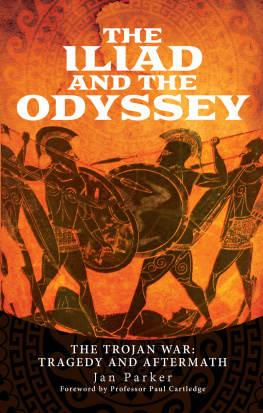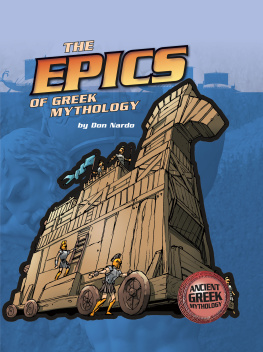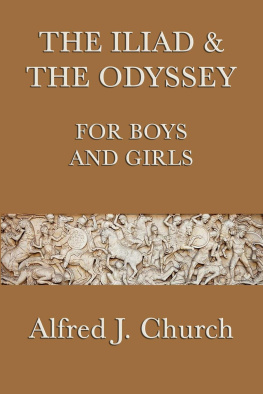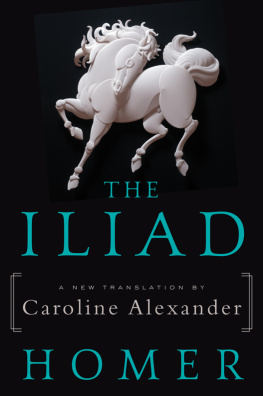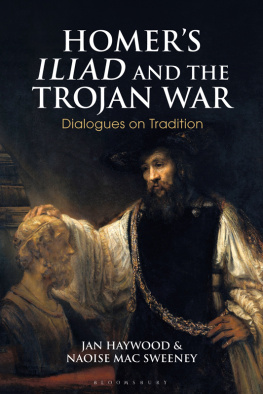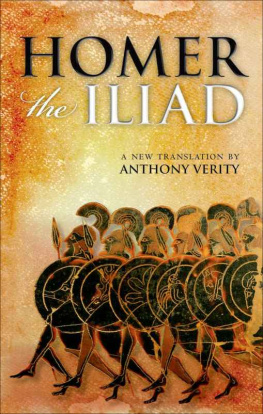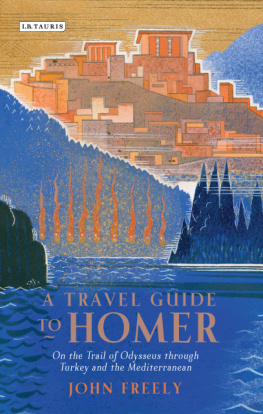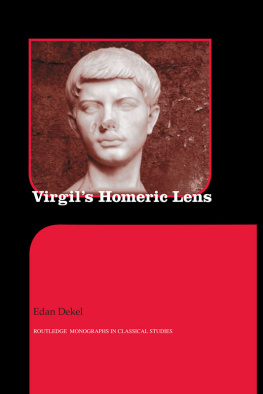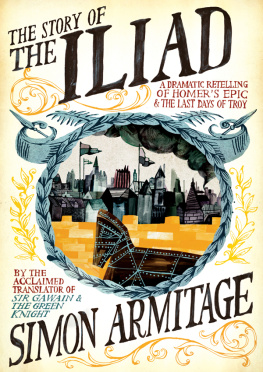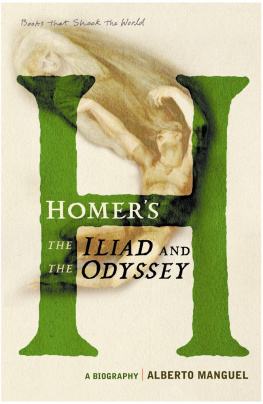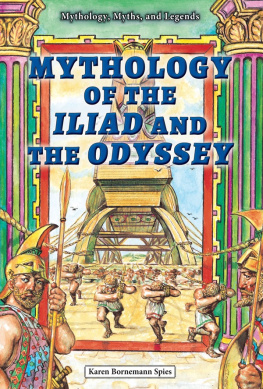Pagebreaks of the print version

The Iliad and the
Odyssey
To Professors Pat Easterling and Lorna Hardwick, for a lifetime of inspiration .
For Fred, Matthew, Imogen, Rosie, Family, with gratitude .
The Iliad and the
Odyssey
The Trojan War:
Tragedy and Aftermath
Jan Parker
First published in Great Britain in 2021 by
Pen & Sword Military
An imprint of
Pen & Sword Books Ltd
Yorkshire Philadelphia
Copyright Jan Parker 2021
Illustrations Copyright Trisha Kelly 2021
ISBN 978 1 52677 993 9
ePUB ISBN 978 1 52677 994 6
Mobi ISBN 978 1 52677 994 6
The right of Jan Parker to be identified as Author of this work has been asserted by her in accordance with the Copyright, Designs and Patents Act 1988.
A CIP catalogue record for this book is available from the British Library.
All rights reserved. No part of this book may be reproduced or transmitted in any form or by any means, electronic or mechanical including photocopying, recording or by any information storage and retrieval system, without permission from the Publisher in writing.
Pen & Sword Books Limited incorporates the imprints of Atlas, Archaeology, Aviation, Discovery, Family History, Fiction, History, Maritime, Military, Military Classics, Politics, Select, Transport, True Crime, Air World, Frontline Publishing, Leo Cooper, Remember When, Seaforth Publishing, The Praetorian Press, Wharncliffe Local History, Wharncliffe Transport, Wharncliffe True Crime and White Owl.
For a complete list of Pen & Sword titles please contact
PEN & SWORD BOOKS LIMITED
47 Church Street, Barnsley, South Yorkshire, S70 2AS, England
E-mail:
Website: www.pen-and-sword.co.uk
Or
PEN AND SWORD BOOKS
1950 Lawrence Rd, Havertown, PA 19083, USA
E-mail:
Website: www.penandswordbooks.com
Note
T his book explores both the Iliad and the Odyssey ; telling rich stories and opening up the questions in both epics that challenged the original audiences and still challenge us today. Each of the Iliad book sections starts with an outline of that books story, in italics, and is followed by an exploration of the themes, narrative structure and Greek ideas about heroic bonds, values and psychology (fully explored in two special key word sections).
Translations are from my copy of the Greek text, by now heavily marked up with question and exclamation marks and underlinings! Although commentaries have many different conventions about the spellings of Greek names, I have used standardized spellings.
Artist Trisha Kelly has reimagined characters and scenes in the text from those illustrated on Classical Greek Black Figure and Red Figure Vases, from descriptions in the text and with the map of Odysseus adventures from Odysseus himself.
Ive been so fortunate in sharing my love of Homer and Greek literature with generations of Cambridge and Open University students and those coming to Open the Text with me on day and summer schools.
I hope that this book will similarly open Homer to readers who may come to share my passion for this extraordinary work.
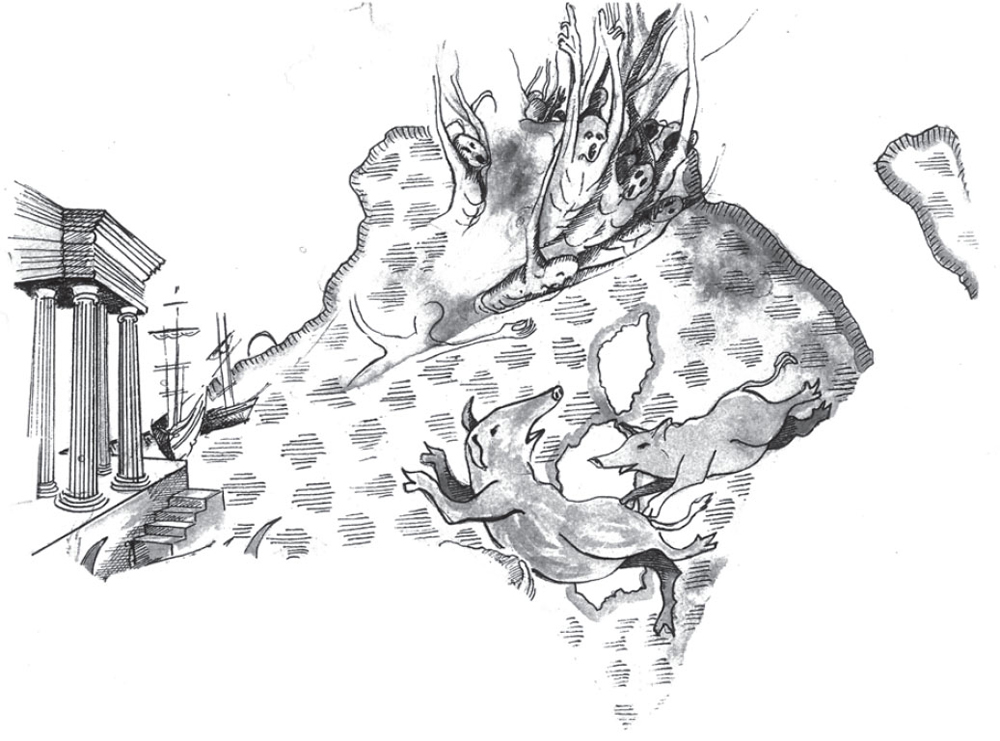
Odysseus Travels
Foreword
Why Read Homer?
by Paul Cartledge (A.G. Leventis Professor of Greek Culture emeritus, University of Cambridge. Commander of the Order of Honour (Greece))
W e classicists and ancient historians have long been amused by the potential confusion and the resulting jokes between our Homer and that character made world-famous by Matt Groening, creator of The Simpsons . Reading the original Homer is no laughing matter though neither is it deadly serious; rather, it is exhilarating and enlightening but it does take the breath away to think that two very long poems, each composed in a verse language never spoken outside the context of a recital of epic poetry, represent the very start of world literature; the oldest literature to have been written down, memorized, recited, continuously, for almost 3,000 years. This makes Greek the longest tradition of continuous poetic language in the whole wide world.
Which means that those two poems, the Iliad and the Odyssey , must have something, something very special, going for them. I am going to be unashamedly personal in these few remarks: it was a reading of Homer, when I was aged just 8, that set me on my lifes course as a classicist, as a historian and as a perpetual student of the ancient Greeks. Of course I didnt then read them in the original ancient Greek: that had to wait until I went to university, when I read the whole of both of them, all forty-eight books and almost 30,000 lines of verse. I soon found that the more one read at a go, the faster ones reading speed and the greater ones enjoyment (some 300 lines an hour, if memory serves).
That was just about a decade after my first introduction as an 8-year-old. Then and I still have the two little books in the mid-1950s I read them both in Told To the Children versions beautifully moderated by Jeannie Lang, daughter of the famous Butcher and (Andrew) Lang duo well known to older and adult classical readers and scholars. And they came with a bonus, one that I learned to appreciate fully only much later illustrations in full colour by a certain William Heath Robinson (yes, the Heath Robinson, so famous for his drawings of highly complex machines and mechanical devices that he has given his name to a saying a Heath Robinson effect).
In my minds eye, I can always still see how Heath Robinson conjured up the Iliad s greatest hero, Achilles, resplendent in the shining new suit of armour that his goddess mother, Thetis, had commissioned from the lame Olympian armourer-god Hephaestus. It didnt occur to me then to wonder how Hephaestus had managed to get the dimensions and the fit just right. But of course it was all done by magic the magic, not least, of the epic poets brilliant description. As a boy, the derring-do of Achilles, especially in his fatal duel with Trojan champion Hektor, was what most caught my attention and fired my imagination.
Even more impressive to my impressionable younger self, though, was the magical mystery tour of the Odyssey , and if for different reasons at different stages of my life my all-time favourite of Homers many characters, who was and is the divine (in more senses than one) lady Calypso. She somehow contrived to keep the eponymous hero Odysseus with her on her small island for more than two-thirds of the ten years it took him finally to get back home from the once-mighty, destroyed city of Troy overlooking the Hellespont/ Dardanelles strait to his small rocky island kingdom of Ithaca off mainland Greeces west coast.
Calypsos name would, to an ancient Greek reader or listener, have instantly conveyed secrecy, something hidden or covered up. But her secret was known to all-seeing Zeus on Mount Olympus, who sent the divine messenger Hermes to order her to let Odysseus go; to let him go home to his faithful Spartan wife, Penelope, who had never given up hope of his eventual return, and done all she possibly could to fight off the attentions of no fewer than 108 suitors, all equally keen to get their hands on Odysseus (presumed) widow and kingdom, and to dispossess her barely adult son Telemachus.

